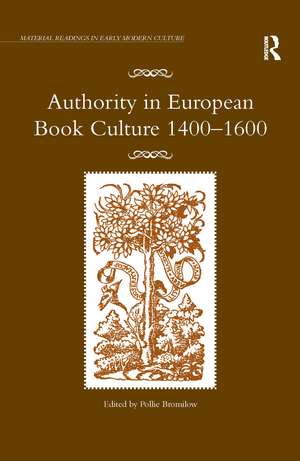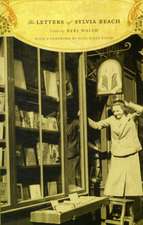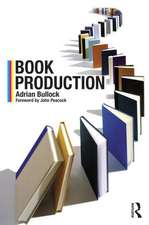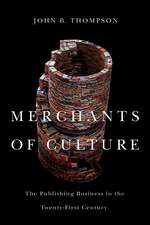Authority in European Book Culture 1400-1600: Material Readings in Early Modern Culture
Autor Pollie Bromilowen Limba Engleză Paperback – 11 noi 2016
| Toate formatele și edițiile | Preț | Express |
|---|---|---|
| Paperback (1) | 323.23 lei 6-8 săpt. | |
| Taylor & Francis – 11 noi 2016 | 323.23 lei 6-8 săpt. | |
| Hardback (1) | 700.80 lei 6-8 săpt. | |
| Taylor & Francis – 23 aug 2013 | 700.80 lei 6-8 săpt. |
Din seria Material Readings in Early Modern Culture
-
 Preț: 311.56 lei
Preț: 311.56 lei -
 Preț: 311.41 lei
Preț: 311.41 lei - 18%
 Preț: 310.44 lei
Preț: 310.44 lei - 16%
 Preț: 274.06 lei
Preț: 274.06 lei -
 Preț: 388.26 lei
Preț: 388.26 lei -
 Preț: 383.33 lei
Preț: 383.33 lei - 20%
 Preț: 260.93 lei
Preț: 260.93 lei - 18%
 Preț: 1001.24 lei
Preț: 1001.24 lei -
 Preț: 413.37 lei
Preț: 413.37 lei -
 Preț: 381.72 lei
Preț: 381.72 lei - 13%
 Preț: 338.33 lei
Preț: 338.33 lei -
 Preț: 416.22 lei
Preț: 416.22 lei -
 Preț: 394.12 lei
Preț: 394.12 lei - 18%
 Preț: 1004.86 lei
Preț: 1004.86 lei - 18%
 Preț: 1058.38 lei
Preț: 1058.38 lei -
 Preț: 386.13 lei
Preț: 386.13 lei -
 Preț: 384.05 lei
Preț: 384.05 lei - 16%
 Preț: 261.73 lei
Preț: 261.73 lei -
 Preț: 397.38 lei
Preț: 397.38 lei -
 Preț: 387.49 lei
Preț: 387.49 lei -
 Preț: 391.65 lei
Preț: 391.65 lei - 13%
 Preț: 351.24 lei
Preț: 351.24 lei -
 Preț: 386.81 lei
Preț: 386.81 lei - 20%
 Preț: 274.46 lei
Preț: 274.46 lei - 18%
 Preț: 1000.27 lei
Preț: 1000.27 lei -
 Preț: 380.03 lei
Preț: 380.03 lei -
 Preț: 489.26 lei
Preț: 489.26 lei - 18%
 Preț: 1114.70 lei
Preț: 1114.70 lei
Preț: 323.23 lei
Nou
Puncte Express: 485
Preț estimativ în valută:
61.85€ • 66.14$ • 51.57£
61.85€ • 66.14$ • 51.57£
Carte tipărită la comandă
Livrare economică 17 aprilie-01 mai
Preluare comenzi: 021 569.72.76
Specificații
ISBN-13: 9781138257054
ISBN-10: 1138257052
Pagini: 248
Dimensiuni: 156 x 234 mm
Greutate: 0.45 kg
Ediția:1
Editura: Taylor & Francis
Colecția Routledge
Seria Material Readings in Early Modern Culture
Locul publicării:Oxford, United Kingdom
ISBN-10: 1138257052
Pagini: 248
Dimensiuni: 156 x 234 mm
Greutate: 0.45 kg
Ediția:1
Editura: Taylor & Francis
Colecția Routledge
Seria Material Readings in Early Modern Culture
Locul publicării:Oxford, United Kingdom
Notă biografică
Pollie Bromilow is Lecturer in French at the University of Liverpool, UK.
Recenzii
'Impressively careful and fine-grained scholarship...very valuable for historians or historicist literary scholars of the period who study book culture or material culture' Renaissance Quarterly 'Taken together, [the essays] serve to ground the notion of authority in the materiality of manuscripts and printed books, and they encourage us to think more critically about how texts came to be regarded as authoritative.' Cahiers de Recherches Médiévales et Humanistes 'Pollie Bromilow presents a cohesive and engaging series of chapters that makes a positive contribution to our appreciation of aspects of authority in early modern print culture. The ostensible objective of the volume is to question the notion of ’authority as an enduring value that has the same presumed sources, agency and effects in the pre-modern period as in the twenty-first century’ ... Bromilow’s careful selection of contributions ensures that the volume achieves its goal of effectively problematising this assumption, while individual chapters remain united in voice and relevant both to each other and current scholarship in the field more broadly.' Parergon '[Bromilow] presents a fresh perspective on the role of authority in late medieval and early modern book production and distribution, and does so in a nuanced and thought-provoking manner. As such, it will appeal to anyone with an interest in the socio-political context of the European book culture of the fifteenth and sixteenth centuries.' CILIP Rare Books and Special Collections Newsletter
Cuprins
Introduction, Pollie Bromilow; Chapter 1 Manuscript, Print, Orality and the Authority of Texts in Renaissance Italy, Brian Richardson; Chapter 2 Books on the Bridge: Writing, Printing and Viral Authority, Adrian Armstrong; Chapter 3 Competing Codes of Authority in mid-Fifteenth Century Burgundy: Martin Le Franc and the Book that Answers Back, Helen Swift; Chapter 4 1This contribution forms part of the Project A4: ‘Transformations of the writing of national and regional history through the reception of antiquity in European humanism’ within the Collaborative Research Centre 644 ‘Transformations of Antiquity’ at the Humboldt University, Berlin. Research for this project was financed by the German Research Foundation. I have much profited from discussions with my colleagues Stefan Schlelein and Patrick Baker and the head of our project, Johannes Helmrath., Albert Schirrmeister; Chapter 5 Schiltberger’s Travels, 1396–1597, Samuel Willcocks; Chapter 6 Print and Political Propaganda under Pope Julius II (1503–13), Massimo Rospocher; Chapter 7 Denis Sauvage – Renaissance Editor of Medieval Manuscripts, Catherine Emerson; Chapter 8 1I borrow this collocation from Susan Sniader Lanser, Fictions of Authority: Women Writers and Narrative Voice (Ithaca, NY: Cornell University Press, 1992). Hélisenne de Crenne and the Angoysses douloureuses qui procedent d’amours (1538), Pollie Bromilow; Chapter 9 1I would like to thank the English Historical Review for permissions to develop material from ‘“All our books do be sent abroad and translated”: Henrician polemic in its international context’, English Historical Review, 121 (2006), 1271–99 (pp. 1276–82, 1292–3). This essay was written during a British Academy PostDoctoral Fellowship; I would like to thank the British Academy for their generous support., Tracey A. Sowerby; Chapter 10 Rebuking the Princes: Erasmus Alber in Magdeburg, 1548–52, Jane Finucane; Chapter 11 Religious Authority and Publishing Success in the Early Modern Jesuit Penitential Book Printing, Robert Aleksander Maryks;
Descriere
The various manifestations of authority have enforced, or acted to prevent, the distribution of books, pamphlets and other print matter in Europe during the late medieval and Renaissance period. This volume analyzes how readers, writers and printers have sometimes rebelled against the constraints and restrictions of authority; and how the written or printed word itself has been perceived to have a kind of authority, with ramifications in social, political or religious spheres.












